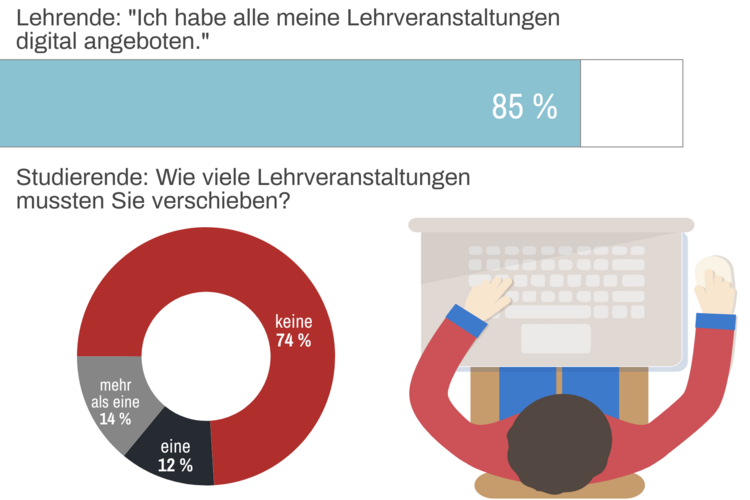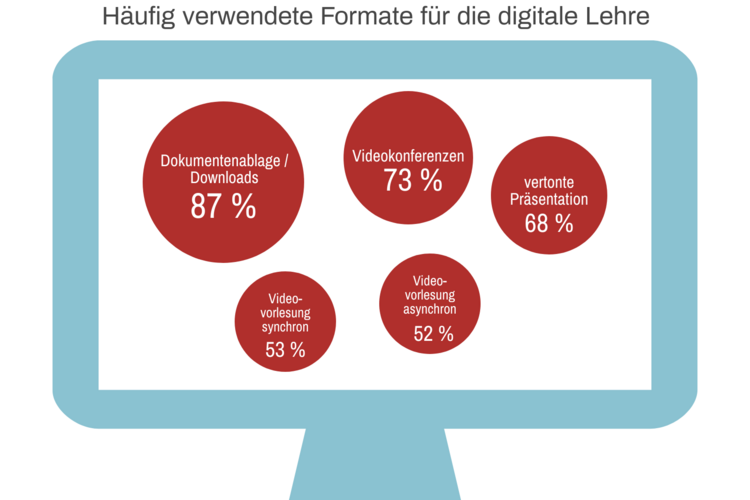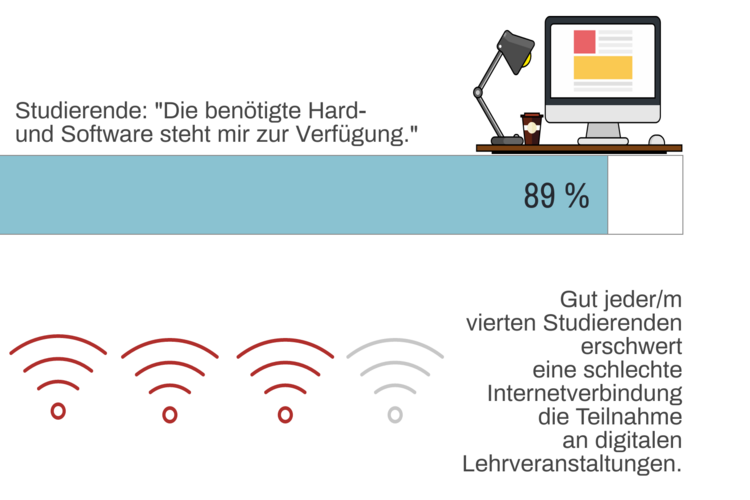Some 4217 students – equivalent to 15 % of the entire student body – took part in the University’s online survey in July 2020. All students had been invited by email to participate, meaning the results can be considered representative. In addition, 785 lecturers already shared their experiences in a similar online survey in May.
Technical shift to online teaching largely successful
Overall, the survey results show that the digitisation of the summer semester was by and large a success. The majority of the lecturers who responded (85 %) reported that they had offered all their courses online; laboratory placements took place mainly in small groups on site. Most students also indicated that they did not need to postpone any of their courses in the summer semester, or that they only postponed one (74 % and 12 % respectively). In optional comments, many students expressed praise as well as appreciation for the swift transition to online teaching.
The coronavirus crisis brought with it organisational challenges: existing course content needed to be converted to digital formats within a short time. Many teaching staff opted to make their material available for students to download. Some 87 % of the students surveyed used this form of teaching. Many lecturers also converted their lectures into digital presentations, adding an audio track (68 %). Video conferences were a frequent means (73 %) of enabling interaction despite the lack of physical attendance. A good half of the students surveyed also took part in video lectures, which were either held in real time at fixed times (53 %) or recorded in advance and made available later (52 %).
Well equipped for online teaching
As regards the technical side, lecturers and students primarily used the University’s own study platform Moodle, presentation software such as PowerPoint and Keynote, and the video conferencing tools BigBlueButton and Zoom.
According to the survey, most students (89 %) had access to the necessary hardware and software. For those who didn’t, support was available from the University Computing Centre (URZ) on request. Despite this, more than one in four students (28 %) also had a poor internet connection that made it difficult to participate in courses online. There were many questions as to the data security offered by certain software solutions – and the URZ quickly reacted to these concerns back in April with a broad roll-out of additional licences for recommended tools.
“To avoid confusion, this winter semester lecturers should also focus as much as possible on the solutions offered by the University Computing Centre,” explained Vice-Rector Thomas Hofsäss.
Motivation and social life suffer due to unprecedented situation
The online semester placed great demands on lecturers and students not only due to the technical challenges, but also with regard to teaching and learning routines, motivation, and social contacts. Nearly half of the students surveyed (46 %) indicated that they found it difficult to participate in courses. A lack of motivation (61 %) and lack of social contacts (60 %) were cited as the main reasons for this. Many lecturers (72 %) also stated that communication with students did not always run smoothly.
Some 82 % of respondents confirmed that some courses are only feasible when taught in person. Nevertheless, just under half of the students (43 %) would like to see more online teaching and learning formats in the future, above all video lectures (57 %) and blended learning (52 %).
“Based on the insights gained, the plan is for many courses in the winter semester 2020/21 to include periods of on-campus teaching, especially for students in the first to third semesters,” explained Vice-Rector Thomas Hofsäss. “Due to the ongoing pandemic, however, offering lectures with a high number of participants will require a different organisational approach. One solution to this dilemma are so-called hybrid courses, which are held only partially on campus, or where the attendees are divided between the analogue and the digital classroom.”
Communication as one challenge in the crisis
The unexpected online summer semester 2020 has shown how important, but also how challenging, good and timely communication is in such an exceptional situation: some 39 % of the students surveyed stated that they would have liked more information on the opportunities and restrictions in their studies, both individually and in relation to their subject. Among other things, students commented on the large number of sources and channels of information. Many were particularly uncertain when it came to how examinations would be organised. In the survey period from early to mid-July, more than half of the respondents (52 %) were concerned that they were not sufficiently informed about whether and how exams would take place, and what this meant for their credits.
“Transparent and comprehensible communication is particularly important in a crisis situation,” said Vice-Rector Thomas Hofsäss. “That’s why, since the beginning of the crisis, the University set up a dedicated website summarising the most important general information, which is continuously updated.”
On the subject of organising examinations, he said: “In May, the University management recommended important guidelines for the conduct of examinations in the summer semester, which allowed the faculties and the University administration to act flexibly according to the needs of each subject. Smooth implementation will take time. In the winter semester, the faculties will provide their own, adapted solutions where necessary.
“I would like to take this opportunity to thank all students, lecturers, advisers and infrastructure staff once again for their commitment.”


































































